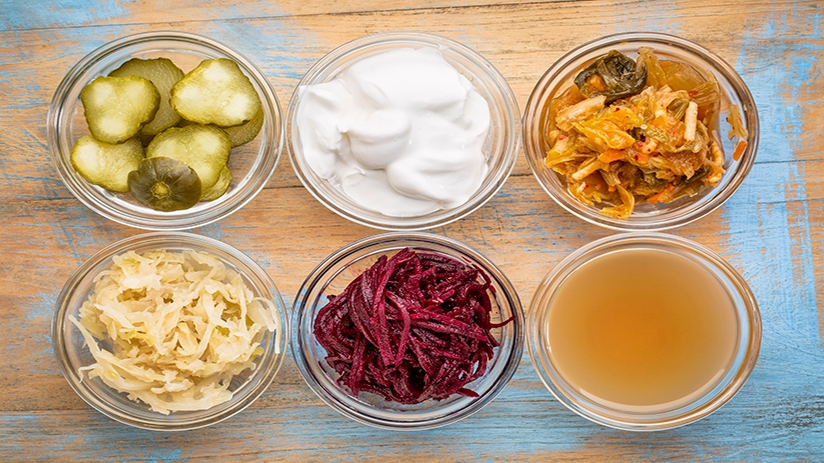How to Ramp up the Probiotics in Your Family's Diet
October 02, 2018 | Food Lion

0 comments, go to comments section to read or to submit a comment.

In recent years, the buzzword in healthy living has been probiotics — with good reason. Probiotics are live bacteria that occur naturally in fermented food or can be taken as supplements. Often called “good bacteria," they offer a wide range of health benefits for everyone in the family, from boosting the immune system to easing allergies and digestive issues. They may even ward off depression, reduce high blood pressure, and decrease cancer risk.
Here are some easy ways to sneak these nutritional superstars into your family's diet.
- Eat more yogurt. For the biggest benefits, skip the sugary varieties — the stuff that's lowest in sugar packs the most probiotic punch, so Food Lion Greek yogurt is a terrific choice. (When in doubt, look for the words “contains live active cultures" or “contains probiotics" on the label.) The tangy, creamy yogurt is yummy on its own, but also makes a great addition to smoothies; mixed with fresh fruit and high fiber granola, it's a satisfying breakfast. Greek yogurt can be subbed for sour cream in almost any dish (and it's unlikely any fussy family members will notice.) Note: If you like yogurt, give kefir a try; the combination of goat's milk and fermented kefir grains also contains a variety of “good" bacteria.
- Load your hot dog with sauerkraut. Yep, sauerkraut — that tangy old-time staple made from fermented cabbage — is a 21st century health food. Sauerkraut is rich with healthy live cultures, and is also packed with vitamins B, A, E, and C. You can make your own at home, but if you're buying sauerkraut bottled or refrigerated, check the label to make sure it hasn't been pasteurized (the process kills probiotic bacteria.) Love spicy Asian food? Try Korean kimchi, a similar side dish made from fermented cabbage, cucumber, or radish. Kimchi is also a great source of beta-carotene, calcium, iron, and vitamins.
- Indulge in olives. Yes, olives. Cured and fermented, they can be a good source of gut-friendly bacteria. So go ahead and treat yourself to some salty, tasty varieties as part of a well-rounded diet — as a topping on pizza, in a Greek salad, or as part of a crudité plate balanced with fresh carrots, peppers, and celery.
- Drink kombucha. Kombucha is a form of fermented tea that contains a high amount of “good" bacteria, and has a tangy, fizzy taste. It's been a staple for centuries in Eastern Europe, Russia, and Japan. Many people swear that it helps increase energy, fight off colds, and even helps them lose weight. You can make it at home with a SCOBY (symbiotic colony of bacteria and yeast from an existing batch) or try store-bought bottled versions.
- Switch to sourdough. You may not think of crusty bread as health food, but this tangy favorite can contain probiotics. Sourdough bread also tends to be low on the glycemic index, so it doesn't spike blood sugar as much as other breads. It's great toasted or as a base for a great sandwich. Even better, try a loaf made with whole grain flour.
- Make it miso. The Japanese favorite is made from fermented soybeans or other grains; having a cup as an appetizer or side dish is a simple way to add probiotics to your family's diet. Thankfully, it's also super-easy to make: Just add a tablespoon or so of miso to hot water for a delicious, healthy soup. (Add tofu and thinly sliced scallions for a version that's similar to those served at Japanese hibachi restaurants.)
- Take a probiotic supplement. If you're not crazy about the probiotic foods listed here, you can always choose one of several over-the-counter supplements to add a dose of gut-friendly bacteria to your diet. Look for a controlled-release form, which allows the capsule or tablet to dissolve slowly, after it passes into the intestinal tract. A good probiotic supplement contains different strains of bacteria, so do check labels before buying.
- Binge on the good stuff. Foods that provide a nurturing environment for gut bacteria, but don't actually contain probiotics, are called “prebiotic." Check out the Food Lion produce department for foods dense in nutritional value: dark, leafy greens; vegetables like broccoli and Brussel sprouts; fruits like apples, plums, prunes, peaches and nectarines (eat the skin for the biggest nutritional boost). High-fiber foods like steel-cut oats and whole grain breads provide a healthy gut environment by getting rid of toxic waste.






Create Your Display Name